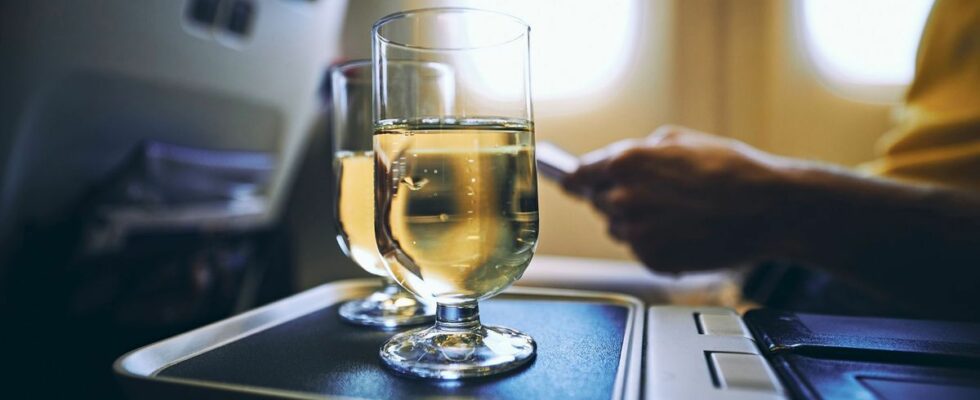Published on
Updated
Reading 2 min.
Who has never been tempted by a glass of wine, or even a glass of champagne, on a long-haul flight? A little pleasure for some, a way to unwind for others, which would however not be without health risks. This is what a new study carried out by German researchers reveals. Which suggest that taking a nap after consuming alcohol would help lower blood oxygen levels and increase heart rate. Explanations.
Summer vacation is just around the corner, and while some are planning to relax on the French or European coasts, others are planning to visit much further afield. Something which will obviously involve a long-haul flight, with all the advantages and disadvantages that this brings, including the famous meals and snacks that passengers often look forward to. These are generally accompanied by a drink, alcoholic or not. A choice which could have an impact on the health of those mainly concerned, according to a new study led by researchers from the Institute of Aerospace Medicine at the German Aerospace Center in Cologne (Germany).
This work starts from a simple observation: sleeping on a plane increases the drop in blood oxygen saturation (SpO2) due to the drop in the partial pressure of oxygen in the cabin. The scientists therefore wanted to evaluate the combined impact of alcohol consumption and hypobaric hypoxia (the decrease in atmospheric air pressure) on sleep, blood oxygen saturation and heart rate. And the verdict seems clear, since the researchers themselves recommend avoiding drinking alcohol during long plane journeys.
To carry out their research, published in the Thorax newspaper, the scientists called on 48 participants aged 18 to 40, whom they divided into two groups: the first was made to sleep in a sleep laboratory with atmospheric pressure equivalent to that of sea level, therefore classic, and a second in a specific chamber where the atmospheric pressure was similar to that felt in an airplane that had reached a certain altitude. Each group was then split into two: some participants consumed alcohol, while others abstained, before sleeping for four hours. All this over two nights, interspersed with recovery periods.
Limit alcohol on a plane
“The combination of alcohol and in-flight hypobaric hypoxia reduced sleep quality, strained the cardiovascular system, and led to prolonged flight duration. [la baisse de la teneur du sang en oxygène]“, we can read as conclusions of this work. In more detail, alcohol consumption associated with hypobaric hypoxia had repercussions on deep sleep and heart rate, as well as on the blood saturation rate. oxygen that has dropped, which can cause many health effects.
“Even in young, healthy individuals, the combination of alcohol consumption and sleeping in hypobaric conditions places considerable strain on the cardiac system and could lead to an exacerbation of symptoms in patients with heart or lung disease.“, said the authors of this work.
And to conclude: “Higher doses of alcohol could amplify these observed effects, potentially increasing the risk of health complications and medical emergencies during flight, particularly among the elderly and those with pre-existing conditions. Our results strongly suggest that in-flight consumption of alcoholic beverages should be limited“.
